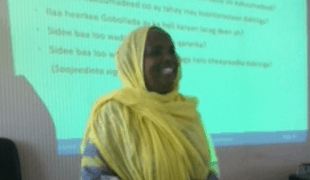Max Planck Foundation organises fourth federalism training
On 12 October 2016, the Max Planck Foundation organised the fourth federalism training for selected staff of the Office of the Prime Minister of the Somali Federal Government (OPM) on Fiscal Federalism. The training is the part of a series of knowledge building trainings on federalism and was attended by 21 staff members of the OPM, including nine women.
Touching on general issues related to the allocation of executive powers and administrative functions between different levels, the training addressed various aspects of fiscal federalism, such as revenue raising powers, expenditure responsibilities or intergovernmental transfers between different levels of government in a federal set-up. Participants looked at relevant provisions of the 2012 Somali Provisional Constitution and drew useful lessons from comparative examples based on the laws and experiences of other federal countries in Africa and beyond that were presented during the workshop.
The Max Planck Foundation’s Technical Advisors led the trainings and ensuing discussions, which focused on pertinent issues of the Somali state-building process in terms of setting up a workable and functioning fiscal system, dividing revenue raising powers and expenditure responsibilities between different levels of government and equalising potential imbalances through intergovernmental transfers. The Max Planck Foundation’s comparative materials delivered in the workshop enabled the participants to undertake detailed comparative analyses so as to contextualise Somali particularities from a comparative perspective.
The training forms the fourth federalism training for staff of the OPM delivered under the Foundation’s project ‘Support to the Federalisation Process’, with support from the German Ministry of Foreign Affairs. The project supports key institutions in the Somali federalisation process through the provision of continuous legal assistance and capacity building.

